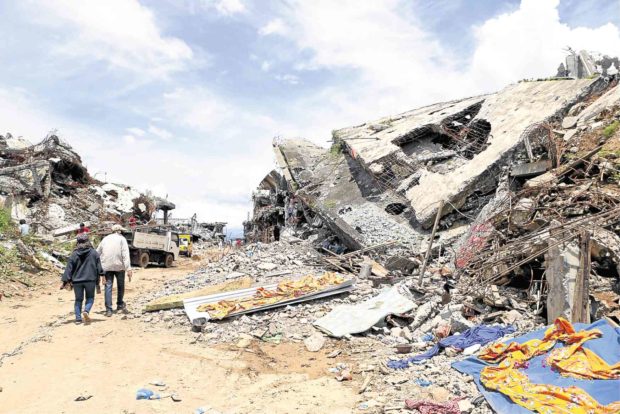
REMAINS OF MARAWI Residents allowed to visit their homes in ground zero of Marawi City are greeted by the sight of rubble, where their houses used to stand. —RICHEL V. UMEL
The government has moved to July the groundbreaking rites for a project to rebuild 250 hectares in Marawi City, known as ground zero for being the battleground between government forces and Islamic State (IS) gunmen, following “bloody” negotiations with the consortium that was likely to get the contract for the project.
Eduardo del Rosario, chair of Task Force Bangon Marawi, which heads the rehab effort in Marawi, said groundbreaking for the project was moved in the hope of finding a “win-win” deal with the best quality at the right cost.
He said negotiations were being finalized with Bagong Marawi, the Chinese-Filipino consortium that was likely to get the rehab contract.
If the negotiations would succeed, it would be announced on June 11 and followed by the start of the process for a Swiss challenge on June 12, Del Rosario said.
Other companies
A Swiss challenge would allow other companies to match or improve on the terms of the original proponent, Bagong Marawi, to win the rehab contract.
Del Rosario said authorities hoped to launch groundbreaking for the rehab by the first week of July.
“Everything is fluid,” he said. “We are working on a timetable,” he added.
Setting the groundbreaking on July 5 or July 6 was “90- or 95-percent accurate,” Del Rosario added.
The task force had scheduled groundbreaking for the rehab project covering 24 of Marawi’s 96 villages in the third week of June had the Swiss challenge been completed in May.
The government had estimated the cost of the rehab at P72 billion, including P17 billion for reconstruction of the area that had been reduced to rubble by the five-month war on IS.
The rehab project’s target completion was December 2021, which Del Rosario confirmed on Friday.
Best deal
Asked why there was a delay, Del Rosario said the task force, composed of different agencies, wanted to be thorough in studying the specs and quality of planned infrastructure and their costs.
The task force, Del Rosario said, wanted a win-win deal that would give the government quality at the right price.
“We had to really negotiate and find out everything, take the views of the developers, take the views of our resource persons and come up with a win-win solution, agreement or compromise,” Del Rosario said.
“So that at the end of the day, the developers are happy, the government panels are happy because we got the right price with a good quality of work,” he said.
Del Rosario said the task force didn’t want to rush things during negotiations with Bagong Marawi.
“The negotiations were really bloody,” he said.
No compromise
“We did not want to compromise the quality and the cost. It’s a balancing act. If this is the quality we want, what would be the appropriate project cost?” he said.
The Department of Finance, he added, would schedule a “pledging session” with development partners from other countries to help raise funds for the rehab project.
Del Rosario thanked the city’s residents for being supportive of the government’s development plan for Marawi City.
“During our consultation, maybe more than 90 percent of the populace was very supportive of our development plan,” Del Rosario said.
“Of course, we cannot satisfy all. There are still some individuals criticizing the plan but getting the support of more than 90 percent is good enough for us,” he added.